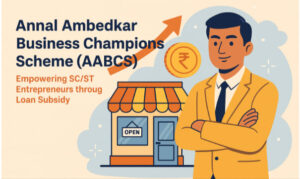The Direct Loans for Business Enterprise Scheme is a significant initiative by the Karnataka Minorities Development Corporation (KMDC) aimed at empowering entrepreneurs from religious minority communities. The scheme provides collateral-based loans up to ₹20 lakhs to help them start or expand their business ventures.
Highlights of Minority Business Loan in Karnataka
• Name: Direct Loans for Business Enterprise Scheme
• Launched by: Karnataka Minorities Development Corporation (KMDC)
• Loan Amount: Up to ₹20 Lakhs
• Interest Rate: 4% (Income below ₹8 Lakhs), 6% (Income between ₹8–15 Lakhs)
• Eligibility: Karnataka residents from religious minority communities
• Collateral: Mortgage of property required
• Application Mode: Online and Offline
Key Benefits
• Loans up to ₹20 lakhs for business startup or expansion.
• 4% interest rate for families with annual income up to ₹8 lakhs.
• 6% interest rate for families with income between ₹8–15 lakhs.
• Enables economic growth for Karnataka’s religious minority communities.
Eligibility Conditions
• Applicant must be a resident of Karnataka.
• Must belong to a recognized religious minority (Muslim, Christian, Sikh, Buddhist, or Jain).
• Age limit: 18 to 55 years.
• Only one member per family is eligible.
• Family income must be below ₹15 lakhs annually.
Exclusions
• Applicants who are loan defaulters of KMDC are not eligible under this scheme.
How to Apply – Online/ Offline Process
Online Steps
-
Visit the official KMDC Website.
-
Fill out the loan application form online with accurate details.
-
Download and print the submitted application form.
Offline Steps
-
Submit the printed application form along with the required documents to your district’s Selection Panel.
-
Upon approval, the loan amount will be directly credited to the applicant’s bank account.
Necessary Documents for Application
• Aadhaar Card (Residential Proof)
• Caste Certificate issued by the competent authority
• Income Certificate issued by the competent authority
• Property-related documents (Lease/Gift/Sale deed, etc.)
• Khata Certificate and Extract or Mutation Copy
• Project Report/Profile (from a Chartered Accountant)
• Property valuation certificate from a registered valuer
• Tax-paid receipts and guidance value of property
• Encumbrance Certificate (EC)/Form 15
• No Objection Certificate (NOC) from family members along with family tree
• Self-declaration form
Documents Required After Selection
• Committee Approval Order
• Applicant’s Affidavit
• Joint Affidavit with Guarantor
• Demand Promissory Note (DPN)
• Hypothecation & Mortgage Deed
• Repayment Letter & Loan Agreement
• Acknowledgment of Debt (Borrower & Guarantor)
• Memorandum of Title Deeds
• Blood Relation Power of Attorney (if applicable)
Frequently Asked Questions (FAQs)
Q: Who is eligible for this loan scheme?
Applicants must be residents of Karnataka, aged between 18 and 55, and belong to religious minority communities.
Q: What are the financial benefits of this scheme?
Eligible applicants can avail loans up to ₹20 lakhs at 4%–6% interest depending on family income.
Q: Is a guarantor or collateral required?
Yes, the loan is provided only against the mortgage of property with supporting documents.
Q: What is the application process for the scheme?
The process involves filling out an online form, printing it, and submitting it offline with relevant documents for approval.
Q: Where can I get the self-declaration, caste certificate, and RTC?
These can be obtained from your local revenue offices or the respective issuing authorities in Karnataka.
References & Important Links
• KMDC Official Website
• Scheme Discription & Guidelines
• Karnataka e-Governance Portal


